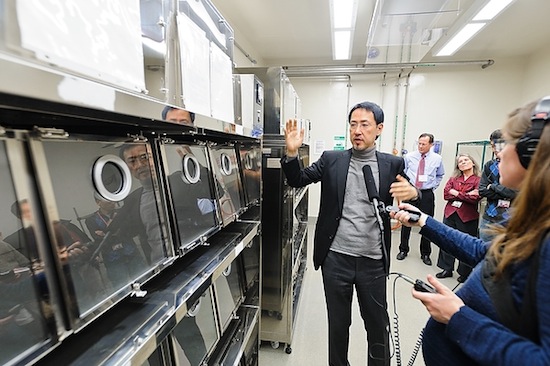UW flu expert elected to National Academy of Sciences

Yoshihiro Kawaoka talks with a group of media representatives during a tour of the Influenza Research Institute in February 2013.
Photo: Bryce Richter
Yoshihiro Kawaoka, a professor of pathobiological sciences in the University of Wisconsin–Madison School of Veterinary Medicine and leading expert on influenza, has been elected to the U.S. National Academy of Sciences (NAS).
Kawaoka, who also holds a faculty appointment at the University of Tokyo, was one of 105 individuals worldwide elected to the country’s preeminent honor society for scientists in recognition of “distinguished and continuing achievements in original research.” He joins the NAS as a foreign associate, a nonvoting member with citizenship outside of the United States.
Membership in NAS, a private organization founded in 1863 through an act of Congress signed by President Abraham Lincoln, is among the highest honors that can be accorded an American scientist or engineer. The academy is charged with providing the nation with independent, objective advice on science and technology.
The only newly elected NAS member from Wisconsin, Kawaoka focuses his work on better understanding naturally occuring viruses to help agencies that monitor them take appropriate meaures for protecting human health. A graduate of Hokkaido University, Kawaoka is a leading authority on influenza, in particular on the molecular factors that play roles in its ability to infect animals and cause disease.
The Wisconsin scientist gained global attention in 2011 when he and an international team of researchers demonstrated that the avian H5N1 influenza virus could become transmissable in mammals following only a few genetic mutations.
Earlier this year, Kawaoka and his team collaborated with a group led by Masato Tashiro of the Influenza Virus Research Center at the National Institute of Infectious Diseases to conduct a genetic analysis of the avian H7N9 flu virus, which has been linked to several deaths in China. The analysis revealed that the virus can evolve and adapt to human cells, prompting concerns about its potential to launch a global flu pandemic.
—Nik Hawkins


